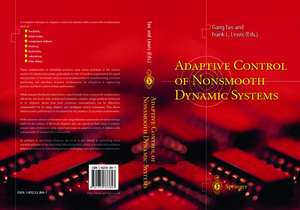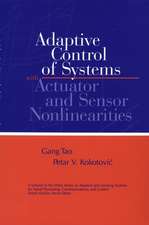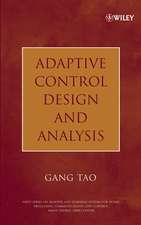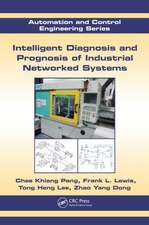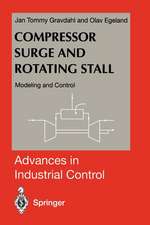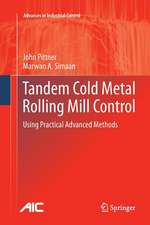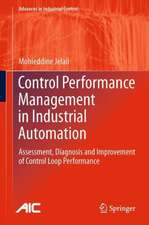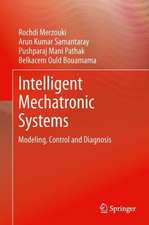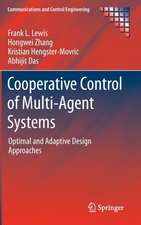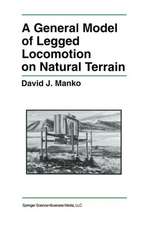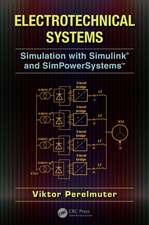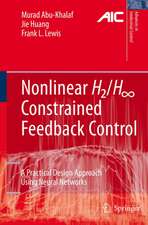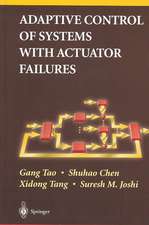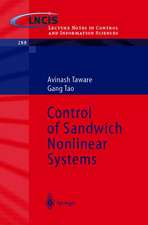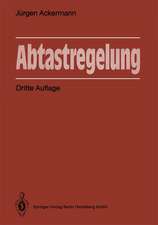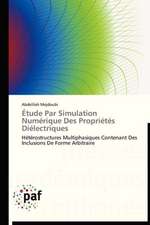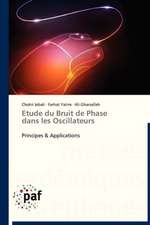Adaptive Control of Nonsmooth Dynamic Systems
Editat de Gang Tao, Frank L. Lewisen Limba Engleză Hardback – 26 sep 2001
Actuator nonlinearities are ubiquitous in engineering practice and limit control system performance. While standard feedback control alone cannot handle these nonsmooth nonlinearities effectively, this book shows how such nonlinear characteristics can be compensated for by using adaptive and intelligent control techniques. This allows desired system performance to be achieved in the presence of uncertain nonlinearities.
With surveys of literature and summaries of various design methods, the contributors present new solutions to some important issues in adaptive control of systems with various sorts of nonsmooth nonlinearities.
The book motivates more research activities in the field of adaptive control of nonsmooth nonlinear industrial systems by formulating several challenging open problems in related areas.
| Toate formatele și edițiile | Preț | Express |
|---|---|---|
| Paperback (1) | 950.96 lei 6-8 săpt. | |
| SPRINGER LONDON – 13 oct 2010 | 950.96 lei 6-8 săpt. | |
| Hardback (1) | 956.33 lei 6-8 săpt. | |
| SPRINGER LONDON – 26 sep 2001 | 956.33 lei 6-8 săpt. |
Preț: 956.33 lei
Preț vechi: 1166.26 lei
-18% Nou
Puncte Express: 1434
Preț estimativ în valută:
182.99€ • 191.06$ • 151.45£
182.99€ • 191.06$ • 151.45£
Carte tipărită la comandă
Livrare economică 04-18 aprilie
Preluare comenzi: 021 569.72.76
Specificații
ISBN-13: 9781852333843
ISBN-10: 1852333847
Pagini: 432
Ilustrații: XXI, 407 p.
Dimensiuni: 155 x 235 x 29 mm
Greutate: 0.76 kg
Ediția:2001
Editura: SPRINGER LONDON
Colecția Springer
Locul publicării:London, United Kingdom
ISBN-10: 1852333847
Pagini: 432
Ilustrații: XXI, 407 p.
Dimensiuni: 155 x 235 x 29 mm
Greutate: 0.76 kg
Ediția:2001
Editura: SPRINGER LONDON
Colecția Springer
Locul publicării:London, United Kingdom
Public țintă
Professional/practitionerCuprins
1. New Models and Identification Methods for Backlash and Gear Play.- 2. Adaptive Dead Zone Inverses for Possibly Nonlinear Control Systems.- 3. Deadzone Compensation in Motion Control Systems Using Augmented Multilayer Neural Networks.- 4. On-line Fault Detection, Diagnosis, Isolation and Accommodation of Dynamical Systems with Actuator Failures.- 5. Adaptive Control of Systems with Actuator Failures.- 6. Multi-mode System Identification.- 7. On Feedback Control of Processes with ‘Hard’ Nonlinearities.- 8. Adaptive Friction Compensation for Servo Mechanisms.- 9. Relaxed Controls and a Class of Active Material Actuator Models.- 10. Robust Adaptive Control of Nonlinear Systems with Dynamic Backlash-like Hysteresis.- 11. Adaptive Control of a Class of Time-delay Systems in the Presence of Saturation.- 12. Adaptive Control for Systems with Input Constraints — A Survey.- 13. Robust Adaptive Control of Input Rate Constrained Discrete Time Systems.- 14. Adaptive Control of Linear Systems with Poles in the Closed LHP with Constrained Inputs.- 15. Adaptive Control with Input Saturation Constraints.- 16. Adaptive Control of Linear Systems with Unknown Time Delay.
Notă biografică
Gang Tao received his B.S. degree in Electrical Engineering from University of Science and Technology of China in 1982, his M.S. degrees in Electrical Engineering, Computer Engineering and Applied Mathematics in 1984, 1987 and 1989, respectively, and Ph.D. degree in Electrical Engineering in 1989, all from University of Southern California. He was a visiting assistant professor at Washington State University from 1989 to 1991, an assistant research engineer at University of California at Santa Barbara from 1991 to 1992, and an assistant professor at University of Virginia from 1992 to 1998, where he is now an associate professor.
He was a guest editor for International Journal of Adaptive Control and Signal Processing, and is currently an associate editor for IEEE Transactions on Automatic Control. He has been a program committee member for several international conferences. He has authored or co-authored one book, over 40 journal papers and book chapters, and over 70 conference papers/presentations on adaptive control, non-linear control, multivariable control, optimal control, control applications and robotics. He is a senior member of IEEE.
His recent research projects include adaptive control of systems with actuator and sensor non-linearities or with actuator failures, adaptive control of multivariable systems, control of sandwich non-linear systems with non-smooth non-linearities, adaptive control of teleoperation systems, and control designs for a magnetic bearing arti_cial heart pump. His research has been supported by NSF, ARMY, NASA, MedQuest, SCEEE, Edison Power.
Frank L. Lewis was born in Wurzburg, Germany, subsequently studying in Chile and Gordonstoun School in Scotland. He obtained the Bachelor's Degree in Physics/Electrical Engineering and the Master's of Electrical Engineering Degree at Rice University in 1971. He spent six years in the U.S. Navy, serving as Navigator aboard the frigate USS Trippe (FF-1075), and Executive Officer and Acting Commanding Officer aboard USS Salinan (ATF-161). In 1977 he received the Master's of Science in Aeronautical Engineering from the University of West Florida. In 1981 he obtained the Ph.D. degree at The Georgia Institute of Technology in Atlanta, where he was employed as a professor from 1981 to 1990 and is currently an Adjunct Professor. He is a Professor of Electrical Engineering at The University of Texas at Arlington, where he was awarded the Moncrief-O'Donnell Endowed Chair in 1990 at the Automation and Robotics Research Institute.
Dr. Lewis has studied the geometric, analytic, and structural properties of dynamical systems and feedback control automation. His current interests include robotics, intelligent control, neural and fuzzy systems, non-linear systems, and manufacturing process control. He is the author/co-author of 2 U.S. patents, 124 journal papers, 20 chapters and encyclopedia articles, 210 refereed conference papers, nine books: Optimal Control, Optimal Estimation, Applied Optimal Control and Estimation, Aircraft Control and Simulation, Control of Robot Manipulators, Neural Network Control, High-Level Feedback Control with Neural Networks, Nonlinear H2/H-Infinity Constrained Feedback Control, Manufacturing Systems Control Design and the IEEE reprint volume Robot Control. Dr. Lewis is a registered Professional Engineer in the State of Texas and was selected to the Editorial Boards of International Journal of Control, Neural Computing and Applications, and Int. J. Intelligent Control Systems. He is currently an Editor for the flagship journal Automatica. He is the recipient of an NSF Research Initiation Grant and has been continuously funded by NSF since 1982. Since 1991 he has received $1.8 million in funding from NSF and upwards of $1 million in SBIR/industry/state funding. He hasreceived a Fulbright Research Award, the American Society of Engineering Education F.E. Terman Award, three Sigma Xi Research Awards, the UTA Halliburton Engineering Research Award, the UTA University-Wide Distinguished Research Award, the ARRI Patent Award, various Best Paper Awards, the IEEE Control Systems Society Best Chapter Award (as Founding Chairman), and the National Sigma Xi Award for Outstanding Chapter (as President). He was selected as Engineer of the year in 1994 by the Ft. Worth IEEE Section and is a Fellow ofthe IEEE. He was appointed to the NAE Committee on Space Station in 1995 and to the IEEE Control Systems Society Board of Governors in 1996. In 1998 he was selected as an IEEE Control Systems Society Distinguished Lecturer. He is a Founding Member of the Board of Governors of the Mediterranean Control Association.
He was a guest editor for International Journal of Adaptive Control and Signal Processing, and is currently an associate editor for IEEE Transactions on Automatic Control. He has been a program committee member for several international conferences. He has authored or co-authored one book, over 40 journal papers and book chapters, and over 70 conference papers/presentations on adaptive control, non-linear control, multivariable control, optimal control, control applications and robotics. He is a senior member of IEEE.
His recent research projects include adaptive control of systems with actuator and sensor non-linearities or with actuator failures, adaptive control of multivariable systems, control of sandwich non-linear systems with non-smooth non-linearities, adaptive control of teleoperation systems, and control designs for a magnetic bearing arti_cial heart pump. His research has been supported by NSF, ARMY, NASA, MedQuest, SCEEE, Edison Power.
Frank L. Lewis was born in Wurzburg, Germany, subsequently studying in Chile and Gordonstoun School in Scotland. He obtained the Bachelor's Degree in Physics/Electrical Engineering and the Master's of Electrical Engineering Degree at Rice University in 1971. He spent six years in the U.S. Navy, serving as Navigator aboard the frigate USS Trippe (FF-1075), and Executive Officer and Acting Commanding Officer aboard USS Salinan (ATF-161). In 1977 he received the Master's of Science in Aeronautical Engineering from the University of West Florida. In 1981 he obtained the Ph.D. degree at The Georgia Institute of Technology in Atlanta, where he was employed as a professor from 1981 to 1990 and is currently an Adjunct Professor. He is a Professor of Electrical Engineering at The University of Texas at Arlington, where he was awarded the Moncrief-O'Donnell Endowed Chair in 1990 at the Automation and Robotics Research Institute.
Dr. Lewis has studied the geometric, analytic, and structural properties of dynamical systems and feedback control automation. His current interests include robotics, intelligent control, neural and fuzzy systems, non-linear systems, and manufacturing process control. He is the author/co-author of 2 U.S. patents, 124 journal papers, 20 chapters and encyclopedia articles, 210 refereed conference papers, nine books: Optimal Control, Optimal Estimation, Applied Optimal Control and Estimation, Aircraft Control and Simulation, Control of Robot Manipulators, Neural Network Control, High-Level Feedback Control with Neural Networks, Nonlinear H2/H-Infinity Constrained Feedback Control, Manufacturing Systems Control Design and the IEEE reprint volume Robot Control. Dr. Lewis is a registered Professional Engineer in the State of Texas and was selected to the Editorial Boards of International Journal of Control, Neural Computing and Applications, and Int. J. Intelligent Control Systems. He is currently an Editor for the flagship journal Automatica. He is the recipient of an NSF Research Initiation Grant and has been continuously funded by NSF since 1982. Since 1991 he has received $1.8 million in funding from NSF and upwards of $1 million in SBIR/industry/state funding. He hasreceived a Fulbright Research Award, the American Society of Engineering Education F.E. Terman Award, three Sigma Xi Research Awards, the UTA Halliburton Engineering Research Award, the UTA University-Wide Distinguished Research Award, the ARRI Patent Award, various Best Paper Awards, the IEEE Control Systems Society Best Chapter Award (as Founding Chairman), and the National Sigma Xi Award for Outstanding Chapter (as President). He was selected as Engineer of the year in 1994 by the Ft. Worth IEEE Section and is a Fellow ofthe IEEE. He was appointed to the NAE Committee on Space Station in 1995 and to the IEEE Control Systems Society Board of Governors in 1996. In 1998 he was selected as an IEEE Control Systems Society Distinguished Lecturer. He is a Founding Member of the Board of Governors of the Mediterranean Control Association.
Textul de pe ultima copertă
A complete reference to adaptive control of systems with nonsmooth nonlinearities such as:
• backlash;
• dead-zones;
• component failure;
• friction;
• hysteresis;
• saturation;
• time delays.
These nonlinearities in industrial actuators cause severe problems in the motion control of industrial processes, particularly in view of modern requirements for speed and precision of movement, such as occur in semiconductor manufacturing, precision machining and elsewhere. Actuator nonlinearities are ubiquitous in engineering practice and limit control system performance.
While standard feedback control alone cannot handle these nonsmooth nonlinearities effectively, this book, with unified and systematic adaptive design methods developed in 16 chapters, shows how such nonlinear characteristics can be effectively compensated for by using adaptive and intelligent control techniques. This allows desired system performance to be achieved in the presence of uncertain nonlinearities.
With extensive surveys of literature and comprehensive summaries of various design methods the authors of the book chapters, who are experts in their areas of interest, present new solutions to some important issues in adaptive control of systems with various sorts of nonsmooth nonlinearities.
In addition to providing solutions, the book is also aimed at motivating more research activities in the important field of adaptive control of nonsmooth nonlinear industrial systems by formulating several challenging open problems in related areas.
• backlash;
• dead-zones;
• component failure;
• friction;
• hysteresis;
• saturation;
• time delays.
These nonlinearities in industrial actuators cause severe problems in the motion control of industrial processes, particularly in view of modern requirements for speed and precision of movement, such as occur in semiconductor manufacturing, precision machining and elsewhere. Actuator nonlinearities are ubiquitous in engineering practice and limit control system performance.
While standard feedback control alone cannot handle these nonsmooth nonlinearities effectively, this book, with unified and systematic adaptive design methods developed in 16 chapters, shows how such nonlinear characteristics can be effectively compensated for by using adaptive and intelligent control techniques. This allows desired system performance to be achieved in the presence of uncertain nonlinearities.
With extensive surveys of literature and comprehensive summaries of various design methods the authors of the book chapters, who are experts in their areas of interest, present new solutions to some important issues in adaptive control of systems with various sorts of nonsmooth nonlinearities.
In addition to providing solutions, the book is also aimed at motivating more research activities in the important field of adaptive control of nonsmooth nonlinear industrial systems by formulating several challenging open problems in related areas.
Caracteristici
Many of the non-smooth, non-linear phenomena covered in this book are of vital importance in almost any field of engineering Contributors from all over the world ensure that no one area's slant on the subjects predominates
